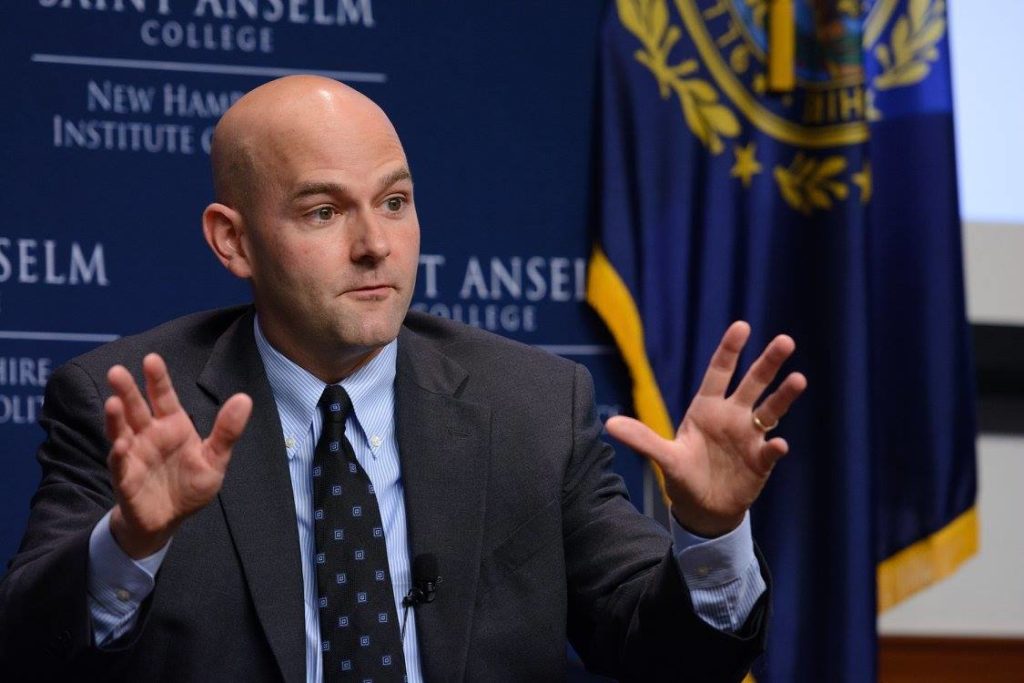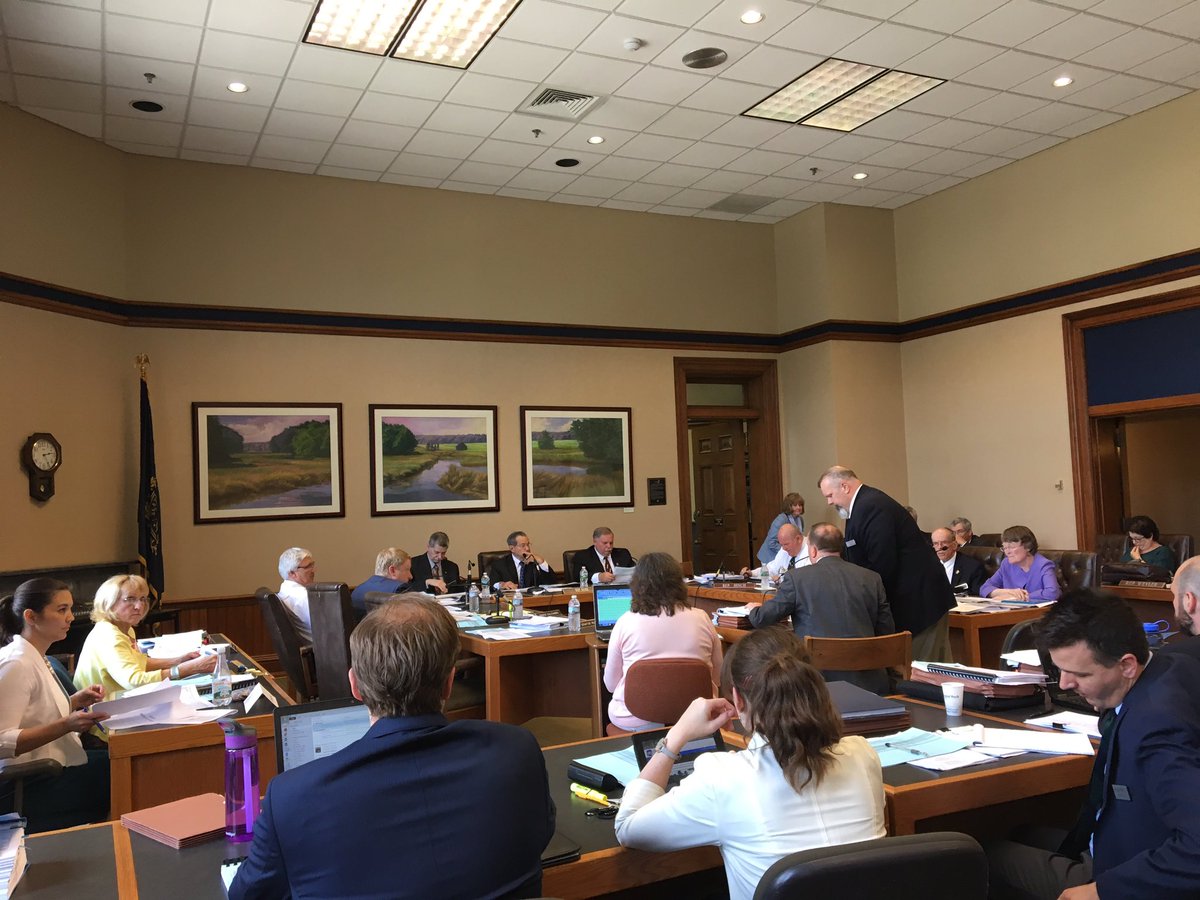
Earlier this month, Democrat Steve Marchand announced he would run for governor in 2018. It’s only three months into Republican Gov. Chris Sununu’s term, which is why Marchand’s announcement was surprising.
Marchand is a Manchester-native and is a first generation Granite Stater. His parents immigrated from Quebec. He was a small business owner, the former mayor of Portsmouth, and director of corporate relations for the University of New Hampshire. He came in second in the Democratic gubernatorial primary in September 2016.
Marchand has been laying the ground work for his gubernatorial campaign for the past few months, meeting with various Democratic groups and committees. He’s already being attacked by the Republican Governors Association for his position on taxes and single-payer healthcare.
NH Journal spoke with Marchand shortly after his announcement to discuss his campaign, what he learned from his previous run, and what voters can expect to see in the coming months. Some responses were lightly edited for length.
NH Journal: Tell me again why you decided to run, and why did you announce so early?
Steve Marchand: The reason I’m running really stems off of my experience last year. We live in a very challenging time in New Hampshire. I believe we need a mission statement that drives…our efforts and resources towards achieving a specific mission and that mission is to be the best state in America to start a family and to start a business. The reason I say that is because I think our two biggest challenges at stake if we are to thrive in the next [few] years is we need to get younger and we need to get more entrepreneurial and nimble as an economy. I don’t believe, with all due respect to our current governor, that there is a specific mission to what he’s trying to achieve, and I don’t believe the policies that he pursued up to this point would move us toward a more younger and entrepreneurial economy. I want to get us in the right direction. If you look at the lack of organization, the lack of focus, and the lack of success early on in 2017, it is a direct reflection of a lack of specific vision, purpose, and mission in Gov. Sununu.
NH Journal: But why did you announce so early? It’s only been three months into Gov. Sununu’s term.
Marchand: It is a little bit earlier than usual, but these are unusual times. A lot of that is driven at the national level with President [Donald] Trump who is already doing rallies for 2020. Gov. Sununu was doing fundraising in Washington for his 2018 campaign. Because we live in these unusual times…it means that if you want to move in the right direction, you don’t have the luxury of waiting while others move forward, no matter how early on the calendar it happens.
NH Journal: You came in second in the Democratic primary after jumping into the race late in the game. Besides announcing early, what is going to be different about this campaign?
Marchand: I got in awfully late last year. It was not a strategy. It was just the way life foregoes. A number of people approached me in March of last year suggesting I would make a very good candidate because they know my background. I had very little money, very little time. I spent about $100,000 total. I got outspent 18 to 1 by the person who beat me [former Democratic gubernatorial nominee Colin Van Ostern]. With very little time and no TV ads or direct mail, it really was the definition of a grassroots effort. So I believe that the message, which is a data-driven message, focused on the mission as I mentioned earlier, resonates not just with Democrats, but across the political spectrum. So starting early allows to me invest more time on the ground. It will make me a better governor. I will continue to learn from people as I campaign. It also means I start with a base of significant support and name identification that simply was not there a year ago when I started.

Photo Credit: Steve Marchand for New Hampshire Facebook page
NH Journal: You ran as a progressive, but fiscally responsible candidate last time. Is that still you? Are there any changes in your platform from before?
Marchand: My value set and my view of the priorities will look very familiar to people who followed my candidacy in 2016. There are some places where there has been a refinement or continued development of knowledge. I am a proud progressive and I’ve got a proud record of fiscal responsibility, and I’m always looking for ways to move ideas and turn them into law.
NH Journal: Gov. Sununu has made encouraging new businesses to come and stay in the state a priority. How would you plan on doing that?
Marchand: I’ve known Gov. Sununu for a long time and he’s a good guy, so it’s obviously nothing personal. However,…the policies he has pursued to grow the economy, largely run 180 degrees from what the data tell us we should be doing if we actually want to create jobs and see economic growth. For example, Chris and the Republican legislature want to cut the Business Profits Tax. Anybody who has spent anytime with entrepreneurs or being an entrepreneur will tell you that most new businesses don’t make a profit in the first five years. They lose money at the beginning. It’s really hard to start a business and see it to the point where it becomes a profitable entity. When we cut the Business Profits Tax, we accelerate what has been going on in the state for 50 years under both Democratic and Republican administrations and that is the downshifting of responsibilities and cost from the state level to the town and local level. If you focus on local property taxes and cutting the Business Enterprise Tax, you will be directly and positively impacting the segment of economy where 80 percent of net new job growth comes to fruition. I think that Chris is focused on talking points when he focuses on the Business Profits Tax, but we need to focus on the data. And the data tells me that focusing on the Business Enterprise Tax and on reducing local property taxes is the winning formula for tax reform that will lead to job creation and economic growth.
NH Journal: You say that it’s crucial to have young people in New Hampshire to become the best state in America. How do you plan to encourage them to stay in the state?
Marchand: I think of dealing with the younger population as a two-part challenge. I don’t think the current governor thinks of it this way. I don’t think our legislature thinks of it this way. I call them [young people] the numerator and denominator problem. The denominator problem is how can we attract young people to come work and live in the state. The problem with that is when you have an ever shrinking number of young kids in the state, you can’t keep 100 percent of them, even if you made college free for everyone. We have to be the most inclusive state that we can be as it relates to immigration. The states that are getting the youngest are seeing the largest influx of immigrants. Some of the rhetoric that has come from President Trump, Gov. Sununu, and members from the Republican legislature make it more difficult for immigrants to see New Hampshire as a great place to come. That’s a shame. If we’re going to get younger and more entrepreneurial, aggressively pursuing pro-immigration policies is going to be an important part of solving our denominator problem because the numerator problem is how can we keep more kids that are already here in the state. The pilot program between higher education and New Hampshire businesses I would pursue that would cost approximately $5 million a year in three programs: computer science, nursing, and education because those are three places where we don’t have enough talent to match the demands. It would create a debt-free college experience for students that enter the program…to work with New Hampshire-based companies or entities. And if they did that, kept their nose clean, kept their grades up, and then worked for one of those New Hampshire-based employers for a period of years after graduation, they would have no debt. It would be half-paid by the private sector participants and half-paid by the targeted state grant for these programs.
NH Journal: You have previously discussed legalizing and taxing marijuana, and increasing the gas tax as ways to increase revenue for the state. Are those positions you still support?
Marchand: Those are areas I continue to discuss. I do favor the legalization, regulation, and taxation of marijuana. I do feel it would have a net positive impact in terms of lowering costs for law enforcement and judicial [entities]. I also think that it will improve health outcomes and reduce addiction rates, and it will generate revenue. The gas tax is…not desirable. That’s definitely a flaw, but I believe when you can attach the revenue stream to the use of the revenue stream, that’s a more transparent system and because infrastructure is a priority. The business leaders I’ve talked to over the years also identified it as a priority. For now, the gas tax is one of the most direct tools in the toolbox. It is something I still have on the table because I think [infrastructure] is one of the biggest barriers we face to economic growth if we do not address and updated electric grid, ensured drinking water, improved Internet access particularly in rural areas, and improving our roads and bridges. Conservative business people tell me ‘why would I invest in New Hampshire, if New Hampshire doesn’t invest in New Hampshire,’ and they meant these infrastructure issues.
NH Journal: What about sales tax and income tax? You were against those previously. Are you still against them?
Marchand: That is correct.

Photo Credit: Steve Marchand For New Hampshire Facebook page
NH Journal: One of the most important issues still facing the state today is the opioid crisis. What do you think still needs to be done to tackle this problem?
Marchand: This is one area in New Hampshire where we have seen bipartisan efforts. I applaud people on both sides of the aisle. Over the last few years, I think they have taken this issue with the level of gravity that is required and I believe there are many more opportunities in the next several years to continue that bipartisan spirit. It doesn’t mean we’re anywhere near where we need to end up, but we have everyone rowing in the same direction about the situation. We need to continue to provide the resources that continue to give a suite of services to those in the midst of recovery, beyond simply detoxification of the addictive substance. Until recently, I think a lot of people in the world of politics saw recovery as largely detoxification. The reality is that if we simply just detoxify people and then we put folks back in a situation where addiction became the norm, the likelihood of relapsing is really high. We need to work together and it requires a level of collaboration that is not inexpensive. But it’s a hell of a lot less expensive than not doing it. That needs to be our attitude. I priced it out last year in that it would be an additional $8 to 10 million a year of resources that would provide a level of stability for local and regional recovery centers to focus less on having to worry about where the next grant will come from in order to stay open. It would allow these people who are doing amazing work in the field of recovery to be able to focus on their gifts and skills to help people. I think it’s a relatively low amount of money…that would improve lives, reduce costs, and directly address what New Hampshireites say is the most important issue facing us.
NH Journal: What do you think needs to happen next year in order for the Democratic Party to gain seats back in the Legislature?
Marchand: Once every four years, the country reorganizes what it means to be a Republican and Democrat. We are in the midst of the next resorting of how people look at what it means to be a Democrat and a Republican. We are not close to the end of that process. We are right in the middle of it. Donald Trump and Bernie Sanders understood better than most the level of economic anxiety that millions of Americans across party lines are feeling. There are a lot of people who are really angry and I get it. I believe that in 2018 and beyond, and it’s part of why I am passionate about this marathon that I’ve begun as a candidate, is to rebuild the future coalition that I believe can be a Democratic majority is one that is passionate about civil liberties, that is passionate about entrepreneurship as the centerpiece to economic growth, that understands that if you think about the economy right way, you can lower income inequality, which right now is splitting our country up in highly destructive ways. We need people that have spent time professionally, politically, and in their personal lives understanding these aspects of it and are unafraid and confident to use that data, experience, and information to lead that way forward. That’s part of what excites me about this marathon that I’ve begun is I feel I have a good idea about where we need to go as a state and want to help us get there.
Follow Kyle on Twitter.
Sign up for NH Journal’s must-read morning political newsletter.









